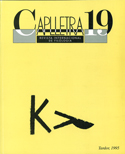Analogia i canvi morfològic: a propòsit de les formes verbals velaritzades
DOI:
https://doi.org/10.7203/caplletra.19.7376Paraules clau:
morfologia, canvi morfològic, analogia, formes verbals velaritzades Resum
Resum
An important series of verbs of the second conjugation exists in Catalan, characterized by a velar obstruent between the radical and the inflectional affixes. This velar segment, which in modern Catalan acts as an extension of the radical, has a heterogeneous historical origin. In short, in certain cases it stems from the strengthening of the glide of the Latin strong perfects in -UI (where w > gw > g); in others, it is justified by the maintaining of the final consonant of the radical in certain forms of the present in verbs such as dico or stringere (DICO > dic, DICAM > diga ...); in others, finally, it is due to changes of a purely analogical nature. In order to explain the latter changes, the theoretical framework of Natural Morphology has been adopted, and the analogical processes are considered to be motivated by a set of principles of morphological naturalness or optimization. To be exact, the inflectional class stability principle, the system congruity principle, the uniformity and transparency principle, and the constructional iconicity principle.
 Descàrregues
Descàrregues
Descàrregues
Publicades
Com citar
-
Resum548
-
PDF656
Número
Secció
Llicència
L’autor o autora que adrece un treball a la redacció de Caplletra perquè siga publicat ha de ser la persona titular legítima dels drets d'explotació. La legitimació per a la publicació del treball ha d’incloure també les imatges, les taules, els gràfics i altres materials que puguen complementar el text, amb independència de si n'és l'autor o autora.
Copyright. Quan publica el treball en la revista, l'autor o autora cedeix a Caplletra. Revista Internacional de Filologia els drets d'explotació (reproducció, distribució i comunicació pública), tant per a l'edició impresa en paper com per a la versió electrònica, que serà accessible mitjançant la xarxa Internet.
Tots els treballs publicats en Caplletra es troben sota una llicència Creative Commons del tipus Reconeixement-NoComercial-SenseObraDerivada 4.0.
RESPONSABILITAT
Caplletra. Revista Internacional de Filologia no s'identifica necessàriament amb els punts de vista mantinguts en els treballs que publica.
Caplletra. Revista Internacional de Filologia declina tota responsabilitat derivada de qualsevol vulneració eventual dels drets de propietat intel·lectual que poguera ser duta a terme pels autors o autores.






